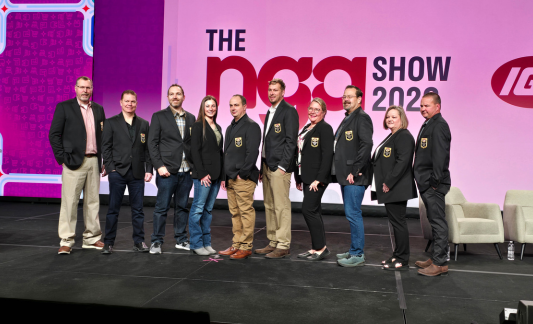Help Isom IGA recover from devasting floods

1 min read
5 Questions About the Employee Retention Credit (ERC)
Written by Jessica Vician
Apr 26, 2023
With the federal Public Health Emergency (PHE) for COVID-19 set to expire on May 11, 2023, many pandemic-era benefits are coming to an end, including the Employee Retention Credit (ERC).
Part of the CARES Act, the ERC rewards businesses that kept employees on payroll during the pandemic. The credit is worth up to $5,000 per employee in 2020 and up to $7,000 per employee per quarter in 2021 (for the first three quarters), resulting in a maximum credit of $26,000 per employee. It is a credit, not a loan, and therefore does not need to be paid back.
Many IGA members have applied for and received the credit, with many working with SyncStream - OnCentive, a team of tax credit and compliance experts who have partnered with retail accounting services firm FMS Solutions to help independent retailers determine if they qualify to receive the Employee Retention Credits.
We spoke with tax experts at FMS Solutions and SyncStream – OnCentive about what happens to the ERC as pandemic benefits are phased out, the risk of being audited if granted the credit, and if it's too late to apply.
Who is still eligible?
Eligible business can claim the ERC retroactively through an amended return for up to three years after the original payroll taxes were due, according to Small Business Legislative Counsel Strategic Policy Director Jessica Summers.
If your business experienced one of the following in 2020 or 2021, SyncStream – OnCentive will assist you in qualifying:
- Interruptions to normal business
- Inventory price increases
- Lack of inventory from vendors
- Had operations partially or fully suspended due to government order
- Change in operating hours
SyncStream – OnCentive Sales Vice President Michelle Kershner notes that many of the 900+ retailers they have worked with incorrectly think they are disqualified from applying for the credit if they accepted a Paycheck Protection Program (PPP) loan, took a Work Opportunity Tax Credit (WOTC), made a profit in 2020 and/or 2021, or never closed their doors. "Those factors do not disqualify a retailer from receiving the ERC," she says.
These misconceptions about eligibility are a key reason FMS has partnered with SyncStream – OnCentive — and why independent retailers should work with the specialized team. "Few CPAs have the time and training required to master the intricacies of the CARES Act and the complex IRS guidance on this topic," Kershner says. "Our team of tax credit experts know how the ERCs are appropriately applied to a grocery retailer’s circumstances, especially because of our long association with FMS.”
Is it too late to apply?
While it's not too late to apply, Kershner recommends contacting qualified tax experts now to get started since it's a lengthy process and the ERC program begins to expire at the end of the 2023 calendar year.
What happens if I'm audited?
Audits can happen to anyone, which is why it's important to follow the rules, gather and keep the documentation related to your application, and work with a reputable company to determine your eligibility. Kershner says some retailers are playing it safe by putting their credit in a bank account to collect interest until after the audit period, when they plan to reinvest it in their business.
"Anything that seems too good to be true, you want a good professional standing behind you," FMS Solutions CEO Bob Graybill says. "Quite frankly, PPP seemed too good to be true. It worked out for a lot of people. [ERC] sounds that way — it's about having the backup and understanding the rules, not just putting your hand out."
Graybill recommends recipients of larger checks, like those over $200,000, be prepared for an audit for the next three years to be safe.
"If you receive a check, it means the IRS has at least looked at it, but they haven't blessed it from an audit perspective," he says. "If you do receive a check and you are audited, backup information is critical. The reality is [the IRS is] going to come back and audit some of these, especially the larger dollars."
That's why Graybill and Kershner urge retailers to choose a reputable company to process their ERC applications.
"We're telling our retailers to really investigate the company you're using," Graybill says, adding that for non-fraudulent filings, the audit period is three years from submission. If you are amending a 2021 return in 2023, the audit period stretches to 2026.
But Graybill stresses that if the IRS identifies fraudulent activity, which includes lying by omission or beefing up numbers to get you more money, there is no limit to when the audit can take place.
"Fraud opens your tax return for that year forever, and ever, and ever."
That's why a reputable filing partner is essential. For example, SyncStream – OnCentive guarantees they will refund any portion of its fee plus any penalties and/or interest attributable to credits or incentives that are disallowed by the IRS, provided they are given reasonable opportunity to defend the correctness of the claimed incentive or credit.
"With a history of $3 billion secured in tax credits and $0 returned to the IRS, our dedication to our clients is unmatched," Kershner says. "If a retailer gets a call from the IRS, we have their back with information supporting the grocer's ERC qualification and calculations."
How do I choose a qualified team to process my credit?
"Unfortunately, there are over 100 ERC processing companies who are pop-up shops," Kershner says, adding that some have been working with grocers and some are even payroll companies.
"Overnight, the CARES Act created a lot of ERC consultancy shops, which are not intended to survive post-ERC," Kershner explains. "For that reason, we strongly recommend working with a business with experience in tax credits beyond the ERC."
With over 120 years of combined tax credit expertise, SyncStream – OnCentive checks those boxes. They recently brought on an experienced IRS attorney, Garrett Gregory, to serve as special counsel for tax compliance.
In addition to finding an experienced company to aid your credit request, consider these qualifications and protocols:
- No upfront payments to evaluate eligibility.
- No upfront "success fee" before filing the credit. SyncStream – OnCentive only charges once your business receives payment of the successfully claimed credit.
- Insurance and ERC process quality guarantees. If the IRS contests a credit, SyncStream – OnCentive will defend their work and pay back their fee and any penalty or interest billed by the IRS.
- Ample references. Speak to other independent retailers who have used the group's services to hear how their experience has been and check their Better Business Bureau (BBB) reviews and ratings.
- Look for CPAs and tax attorneys on staff.
How do I find out more?
SyncStream – OnCentive hosts recurring webinars every Thursday at 2:00 p.m. Central for IGA retailers. Register for the webinar via the link below and you will receive a confirmation email with the link to join.
Employee Retention Credits Returning Big Money to Retailers
Thursdays
2:00 p.m. Central
You May Also Like
These Stories on Feature Story
Feb 5, 2026 6:52:32 PM |
2 min read




No Comments Yet
Let us know what you think